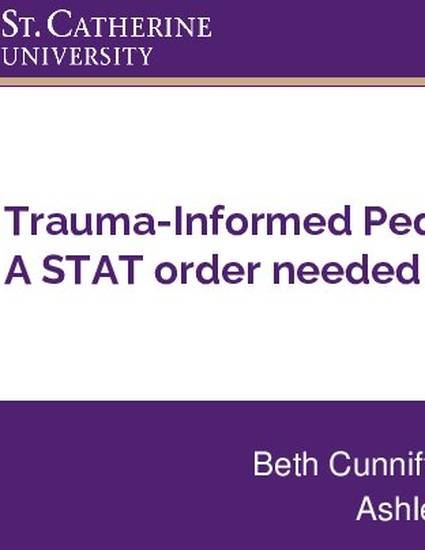
Presentation
Trauma-Informed Pedagogy: A STAT order needed for Nurse Educators
Nurse Educator Conference of the Rockies
(2023)
Abstract
Trauma-Informed Pedagogy: A STAT Order Needed for Nurse Educators
Trauma is currently a buzzword in education, but for many students is a personal reality and a complicated phenomenon (Yielding, 2022).The world experienced collective trauma as the global COVID-19 pandemic unfolded, morally burdening healthcare providers while caring for clients and families (Sherwood et al., 2021). A nation watched in horror as George Floyd was murdered at the hands of police, reigniting protests in communities across the United States. Individuals may currently or have previously experienced trauma in their own lives. Therefore, nurse educators must acknowledge these personal, local, and global challenges to optimally support student nurses throughout their educational journey.
The Substance Abuse and Mental Health Services Administration (SAMHSA) states that trauma is “a result of violence, abuse, neglect, loss, disaster, war and other emotionally harmful experiences” (SAMHSA, 2014, p. 1). Worldwide, over 70% of adults have experienced a traumatic event, with 30% of individuals experiencing four or more (Benjet et al., 2016). Although anyone may experience trauma, some populations are at greater risk, including youths of color, individuals of lower socioeconomic status, and vulnerable populations (Crosby, 2015).
Nursing students are not immune and may experience individual, interpersonal, institutional, organizational, or community trauma during the school curriculum (Mayer et al., 2022). In a study by Kameg et al. (2021), more than 50% of nursing students experienced exposure to at least one traumatic event in childhood. A history of trauma can lead to an inability to cope with daily stressors, a decreased ability to trust others and benefit from relationships, increased internalizing behaviors such as anxiety and depression, and exhibiting externalizing behaviors including the inability to regulate actions or control the expression of emotions (SAMHSA, 2014). Nurse educators may observe these student behaviors but often lack the language, tools, and strategies to support these individuals. Furthermore, nursing school can be a traumatic experience and have the potential for retraumatization for students who have experienced adversity during childhood (Mayer et al., 2022).
To combat the trauma that nursing students may experience and nursing school may elicit, educators can be guided by a trauma-informed pedagogy. Building on the principles of trauma-informed care developed by SAMHSA (2014), trauma-informed pedagogy incorporates “practices that recognize and center the impact of trauma on individuals and communities” (Thompson & Carello, 2022, p. 175). Nurse educators can apply the principles of trauma-informed pedagogy to their class content, policies, and teaching practices to support students who have experienced trauma, prevent retraumatization, and develop as trauma-informed practitioners (Carello & Butler, 2015).
Through the use of presentation and small group discussion, this session will provide nurse educators in all settings, knowledge about trauma and trauma-informed pedagogy, the ability to recognize students at risk, and holistic strategies to respond and prevent retraumatization. Participants will gain skills to implement trauma-informed pedagogy into their nurse educator practice and influence practices and policies at their institution.
References
Benjet, C., Bromet, E., Karam, E. G., Kessler, R. C., McLaughlin, K. A., Ruscio, A. M., Shahly, V., Stein, D. J., Petukhova, M., Hill, E., Alonso, J., Atwoli, L., Bunting, B., Bruffaerts, R., Caldas-de-Almeida, J.M., de Girolamo, G., Florescu, S., Gureje, O., Huang, Y., . . . Koenen, K. C. (2016). The epidemiology of traumatic event exposure worldwide: Results from the World Mental Health Survey Consortium. Psychological Medicine, 46(2), 327-343. https://doi.org/10.1017/S0033291715001981
Carello, J., & Butler, L. D. (2015). Practicing what we teach: Trauma-informed educational practice. Journal of Teaching in Social Work, 35(3), 262-278. https://doi.org/10.1080/08841233.2015.1030059
Crosby, S. D. (2015). An ecological perspective on emerging trauma-informed teaching practices. Children & Schools, 37(4), 223-230. https://doi.org/10.1093/cs/cdv027
Kameg, B., & Mitchell, A. (2021). Associations between adverse childhood experiences and substance use in nursing students. Journal of Psychosocial Nursing and Mental Health Services, 59(7), 43-47. https://doi.org/10.3928/02793695-20210219-03
Mayer, K. A., Linehan, K. J., & MacMillan, N. K. (2022). Student perspectives on potential sources of trauma exposure during nursing school. Nursing Forum, 57(5), 833-842. https://doi.org/10.1111/nuf.12728
Sherwood, D., VanDeusen, K., Weller, B., & Gladden, J. (2021). Teaching note - trauma content online during COVID-19: A trauma-informed and culturally responsive pedagogy. Journal of Social Work Education, 57(sup1), 99-110. https://doi.org/10.1080/10437797.2021.1916665
Substance Abuse and Mental Health Services Administration (SAMHSA). (2014, July). SAMHSA's concept of trauma and guidance for a trauma-informed approach. https://store.samhsa.gov/sites/default/files/d7/priv/sma14-4884.pdf
Thompson, P., & Carello, J. (Eds.). (2022). Trauma-informed pedagogies: A guide for responding to crisis and inequality in higher education. Springer International Publishing AG.
Yeilding, G. (2021). Review of the vulnerable heart of literacy. The Professional Educator, 44(1), 37-39. https://doi.org/10.47038/tpe.44.01.02
Keywords
- trauma,
- nursing student,
- pedagogy
Disciplines
Publication Date
July 12, 2023
Location
Breckenridge, CO
Citation Information
Ashley Borchardt and Beth Cunniff. "Trauma-Informed Pedagogy: A STAT order needed for Nurse Educators" Nurse Educator Conference of the Rockies (2023) Available at: http://works.bepress.com/ashley-borchardt/1/
